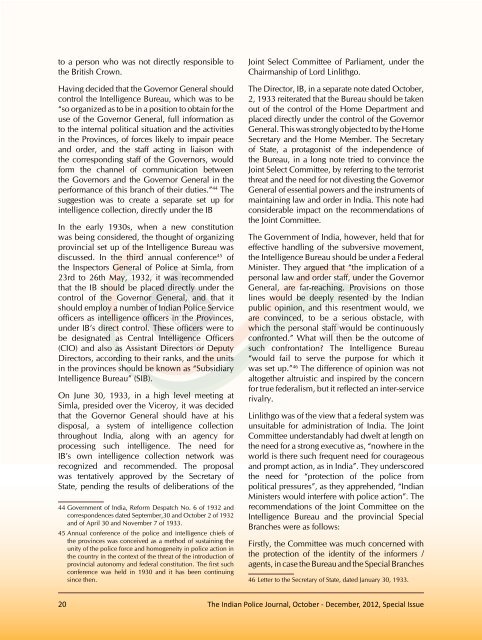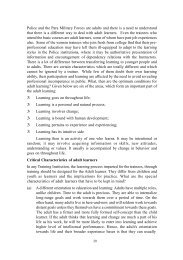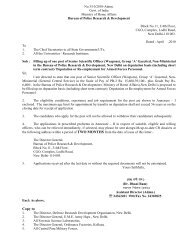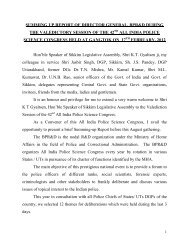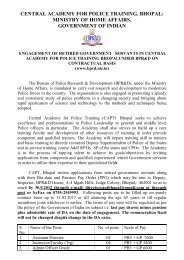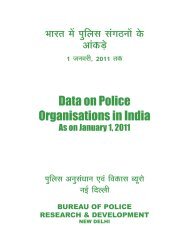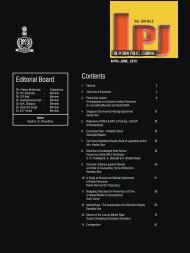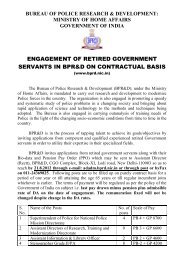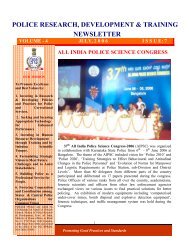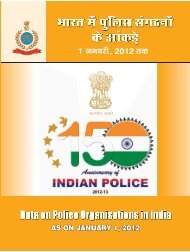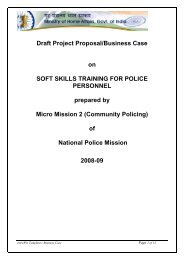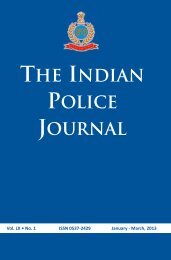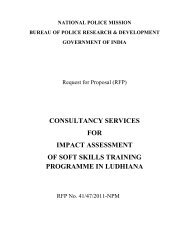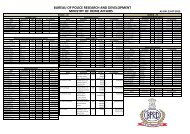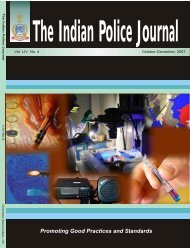to a person who was not directly responsible tothe British Crown.Having decided that the Governor General shouldcontrol the Intelligence <strong>Bureau</strong>, which was to be“so organized as to be in a position to obtain for theuse <strong>of</strong> the Governor General, full information asto the internal political situation <strong>and</strong> the activitiesin the Provinces, <strong>of</strong> forces likely to impair peace<strong>and</strong> order, <strong>and</strong> the staff acting in liaison withthe corresponding staff <strong>of</strong> the Governors, wouldform the channel <strong>of</strong> communication betweenthe Governors <strong>and</strong> the Governor General in theperformance <strong>of</strong> this branch <strong>of</strong> their duties.” 44 Thesuggestion was to create a separate set up forintelligence collection, directly under the IBIn the early 1930s, when a new constitutionwas being considered, the thought <strong>of</strong> organizingprovincial set up <strong>of</strong> the Intelligence <strong>Bureau</strong> wasdiscussed. In the third annual conference 45 <strong>of</strong>the Inspectors General <strong>of</strong> <strong>Police</strong> at Simla, from23rd to 26th May, 1932, it was recommendedthat the IB should be placed directly under thecontrol <strong>of</strong> the Governor General, <strong>and</strong> that itshould employ a number <strong>of</strong> Indian <strong>Police</strong> Service<strong>of</strong>ficers as intelligence <strong>of</strong>ficers in the Provinces,under IB’s direct control. These <strong>of</strong>ficers were tobe designated as Central Intelligence Officers(CIO) <strong>and</strong> also as Assistant Directors or DeputyDirectors, according to their ranks, <strong>and</strong> the unitsin the provinces should be known as “SubsidiaryIntelligence <strong>Bureau</strong>” (SIB).On June 30, 1933, in a high level meeting atSimla, presided over the Viceroy, it was decidedthat the Governor General should have at hisdisposal, a system <strong>of</strong> intelligence collectionthroughout India, along with an agency forprocessing such intelligence. The need forIB’s own intelligence collection network wasrecognized <strong>and</strong> recommended. The proposalwas tentatively approved by the Secretary <strong>of</strong>State, pending the results <strong>of</strong> deliberations <strong>of</strong> the44 Government <strong>of</strong> India, Reform Despatch No. 6 <strong>of</strong> 1932 <strong>and</strong>correspondences dated September,30 <strong>and</strong> October 2 <strong>of</strong> 1932<strong>and</strong> <strong>of</strong> April 30 <strong>and</strong> November 7 <strong>of</strong> 1933.45 Annual conference <strong>of</strong> the police <strong>and</strong> intelligence chiefs <strong>of</strong>the provinces was conceived as a method <strong>of</strong> sustaining theunity <strong>of</strong> the police force <strong>and</strong> homogeneity in police action inthe country in the context <strong>of</strong> the threat <strong>of</strong> the introduction <strong>of</strong>provincial autonomy <strong>and</strong> federal constitution. The first suchconference was held in 1930 <strong>and</strong> it has been continuingsince then.Joint Select Committee <strong>of</strong> Parliament, under theChairmanship <strong>of</strong> Lord Linlithgo.The Director, IB, in a separate note dated October,2, 1933 reiterated that the <strong>Bureau</strong> should be takenout <strong>of</strong> the control <strong>of</strong> the Home Department <strong>and</strong>placed directly under the control <strong>of</strong> the GovernorGeneral. This was strongly objected to by the HomeSecretary <strong>and</strong> the Home Member. The Secretary<strong>of</strong> State, a protagonist <strong>of</strong> the independence <strong>of</strong>the <strong>Bureau</strong>, in a long note tried to convince theJoint Select Committee, by referring to the terroristthreat <strong>and</strong> the need for not divesting the GovernorGeneral <strong>of</strong> essential powers <strong>and</strong> the instruments <strong>of</strong>maintaining law <strong>and</strong> order in India. This note hadconsiderable impact on the recommendations <strong>of</strong>the Joint Committee.The Government <strong>of</strong> India, however, held that foreffective h<strong>and</strong>ling <strong>of</strong> the subversive movement,the Intelligence <strong>Bureau</strong> should be under a FederalMinister. They argued that “the implication <strong>of</strong> apersonal law <strong>and</strong> order staff, under the GovernorGeneral, are far-reaching. Provisions on thoselines would be deeply resented by the Indianpublic opinion, <strong>and</strong> this resentment would, weare convinced, to be a serious obstacle, withwhich the personal staff would be continuouslyconfronted.” What will then be the outcome <strong>of</strong>such confrontation? The Intelligence <strong>Bureau</strong>“would fail to serve the purpose for which itwas set up.” 46 The difference <strong>of</strong> opinion was notaltogether altruistic <strong>and</strong> inspired by the concernfor true federalism, but it reflected an inter-servicerivalry.Linlithgo was <strong>of</strong> the view that a federal system wasunsuitable for administration <strong>of</strong> India. The JointCommittee underst<strong>and</strong>ably had dwelt at length onthe need for a strong executive as, “nowhere in theworld is there such frequent need for courageous<strong>and</strong> prompt action, as in India”. They underscoredthe need for “protection <strong>of</strong> the police frompolitical pressures”, as they apprehended, “IndianMinisters would interfere with police action”. Therecommendations <strong>of</strong> the Joint Committee on theIntelligence <strong>Bureau</strong> <strong>and</strong> the provincial SpecialBranches were as follows:Firstly, the Committee was much concerned withthe protection <strong>of</strong> the identity <strong>of</strong> the informers /agents, in case the <strong>Bureau</strong> <strong>and</strong> the Special Branches46 Letter to the Secretary <strong>of</strong> State, dated January 30, 1933.20The Indian <strong>Police</strong> Journal, October - December, 2012, Special Issue
came under the control <strong>of</strong> Indian ministers. Theyrecommended that “the records <strong>of</strong> any suchintelligence department should be protectedfrom even the slightest danger <strong>of</strong> leakage.” Toobviate the possibility <strong>of</strong> the Indian ministerscoming to know the names <strong>of</strong> such agents, theCommittee recommended that “the instruments<strong>and</strong> instructions <strong>of</strong> the Government shouldspecifically require them to give directions that norecord relating to intelligence affecting terrorism,should be disclosed to anyone other than oneor two persons, who are directly dealing withthem.”Secondly, the Committee was <strong>of</strong> the view that nopurpose would be adequately served by placingthe Special Branch <strong>of</strong> the province under theGovernor. Instead, they recommended that theGovernor should be empowered to assume charge<strong>of</strong> the department, if, according to him, the peace<strong>and</strong> tranquility <strong>of</strong> the province is endangered, byovert or secret activities <strong>of</strong> persons who intend tooverthrow the Government.Thirdly, the Committee did not agree withthe suggestion that the IB should be under theexclusive control <strong>of</strong> the Governor General <strong>and</strong>that the provincial Special Branches will becontrolled by the IB. There should, however,be close touch between the two, but to put theprovincial intelligence units under the Intelligence<strong>Bureau</strong> will tend “to break up the organic unity <strong>of</strong>the provincial police force.”Fourthly, on the question <strong>of</strong> exclusive control<strong>of</strong> the Governor General over the IB, theCommittee stated that the IB “should, underthe new constitution, be assigned one <strong>of</strong> theGovernor General’s reserved departments, aspart <strong>of</strong> its normal activities.” The Committee,however, hoped that “the change in the form<strong>of</strong> Government, whether in the Centre or in theProvinces, should not involve any change in therelationship, which at present exists betweenthe Intelligence <strong>Bureau</strong> <strong>and</strong> the ProvincialIntelligence departments.”The Government <strong>of</strong> India Act, 1935 gave legalsanction to the suggestions. The Intelligence<strong>Bureau</strong> remained, by <strong>and</strong> large, under the directcontrol <strong>of</strong> the Governor General, though theHome Department <strong>of</strong> the Federal Governmentremained its immediate controlling authority.The fear that haunted the conscientiousIB <strong>of</strong>ficers, both at the Centre <strong>and</strong> in theProvinces, was that when the Provincial SpecialBranches would come under the Indian HomeMinisters, classified information about theNon-Cooperation <strong>and</strong> Civil Disobediencemovements, as well as some records <strong>of</strong> terroristactivities, might be leaked, resulting in exposure<strong>of</strong> sources, jeopardizing the safety <strong>of</strong> the agents<strong>and</strong> informers. Thus, the credibility <strong>of</strong> entireorganization will be demolished.When the new ministers assumed <strong>of</strong>fice in theProvinces under the Government <strong>of</strong> India Act,1935, the mutual distrust between the intelligenceagencies <strong>and</strong> the people’s representatives wenton increasing. Many important secret <strong>and</strong> topsecret files, relating to the Non-cooperation<strong>and</strong> Civil Disobedience movements, were sentto the <strong>of</strong>fice <strong>of</strong> CIO <strong>of</strong> the Intelligence <strong>Bureau</strong>,which was statutorily secured from ministerialinterference, or to the Governor’s secretariat,either for destruction or for transfer to moresecured places. The Provincial Governmentsfrequently complained <strong>of</strong> spying on them by theCentral Intelligence.Control over the Intelligence organizationsremained a contentious issue till the outbreak<strong>of</strong> the Second World War, when under theDefence <strong>of</strong> India Act, ministerial authority overthe intelligence organizations was reduced.Again, on the eve <strong>of</strong> independence there wasgreat confusion about the sensitive records <strong>of</strong>the IB. Eventually, many records, especiallythose relating to the identity <strong>of</strong> the sources <strong>and</strong>informers, were destroyed. Many sensitive fileswere removed to Engl<strong>and</strong>. From many files,which are still in IB records, relevant papers havebeen removed, with a note in the notesheet.In the post-independence era, the Intelligence<strong>Bureau</strong> has exp<strong>and</strong>ed consequent upon themultiplicity <strong>of</strong> the problems that the nation hasbeen encountering. This great institution hasspawned several important security organizationslike Special Service <strong>Bureau</strong>, Special Security Force,Aviation <strong>Research</strong> Center, Indo-Tibetan Border<strong>Police</strong> Force, <strong>Research</strong> <strong>and</strong> Analysis Wing,<strong>Bureau</strong> <strong>of</strong> Aviation Security, Special ProtectionGroup, all for safeguarding the nation againstthe forces <strong>of</strong> disorder <strong>and</strong> destabilization.The Indian <strong>Police</strong> Journal, October - December, 2012, Special Issue 21
- Page 1 and 2: The Indian Police JournalOctober -
- Page 3 and 4: From the Director’s DeskNew Delhi
- Page 5 and 6: 23rd December, 1887: TheJourney beg
- Page 7 and 8: Courtesy - National Archives of Ind
- Page 9 and 10: The Logo released on the completion
- Page 11 and 12: Helmsmen of the IB during thePre-In
- Page 13 and 14: SHRI V.G. VAIDYA, IPS(MAR 1992 TO J
- Page 15 and 16: “Sleeman sahib ki jai”“No Cri
- Page 17 and 18: their life and their problems relat
- Page 19 and 20: Settling down of criminal tribes wa
- Page 21 and 22: perish. Between 1841 and 1848, anot
- Page 23 and 24: In conclusion, I would like to reco
- Page 25 and 26: own race alone, had to be withdrawn
- Page 27 and 28: a bee in his bonnet” 17 , and abo
- Page 29 and 30: epresented by Tilak and his followe
- Page 31 and 32: The agency more and more fine-tuned
- Page 33: US was brewing, one William Hopkins
- Page 37 and 38: neutralised many efforts by inimica
- Page 39 and 40: e published by the Intelligence Bur
- Page 41 and 42: As DD (Security), IB, I had occasio
- Page 43 and 44: Chhomohlohri, all of them juxtapose
- Page 45 and 46: Dormers Building, ShimlaThe Dormers
- Page 47 and 48: eforms. Warren Commission, on the a
- Page 49 and 50: and systems will increasingly come
- Page 51 and 52: violence and destabilisation. This
- Page 53 and 54: one develop. The all pervasive cult
- Page 55 and 56: etween the states and the centre su
- Page 57 and 58: Intelligence Agencies inIndian Demo
- Page 59 and 60: Democracies are, today, everywhere
- Page 61 and 62: depend substantially on the restrai
- Page 63 and 64: Of Pistols and Pigs andthe Old Tidd
- Page 65 and 66: it is lovingly caressed hundreds of
- Page 67 and 68: Through the Eyes of an IB OfficerSh
- Page 69 and 70: an Intelligence agency. He used to
- Page 71 and 72: My J&K ExperienceShri R.K. Kapoor,
- Page 73 and 74: there. We remained stranded there f
- Page 75 and 76: Scaling Himalayan Heights withthe I
- Page 77 and 78: proceed to Dungti to supervise the
- Page 79 and 80: tour of the White House and Lincoln
- Page 81 and 82: into unconsciousness two hours earl
- Page 83 and 84: which was completed successfully wi
- Page 85 and 86:
leaders. This happened around the t
- Page 87 and 88:
My Unforgettable Yearsin the North-
- Page 89 and 90:
stated that Prakash Singh, Assistan
- Page 91 and 92:
take her into confidence. That woul
- Page 93 and 94:
Police - Intelligence InterfaceShri
- Page 95 and 96:
Shreekant Bapat and I surveyed the
- Page 97 and 98:
excellence, dedication and commitme
- Page 99 and 100:
Immigration, Inter-State Disputes,
- Page 101 and 102:
Observations on India’s State and
- Page 103 and 104:
assessments that arose after the ca
- Page 105 and 106:
levels. The deficiencies of one par
- Page 107 and 108:
of laying a network of useful roads
- Page 109 and 110:
Technology in Intelligence-Future S
- Page 111 and 112:
These are just some of the aspects
- Page 113 and 114:
Figure 6: Open Source Information o
- Page 115 and 116:
events) and inference from evidence
- Page 117 and 118:
9North Atlantic Treaty Organization
- Page 119 and 120:
Shri Dave was posted back to the lB
- Page 121 and 122:
He even suggested separate pay scal
- Page 123 and 124:
The Unsung HeroesThe Intelligence B


